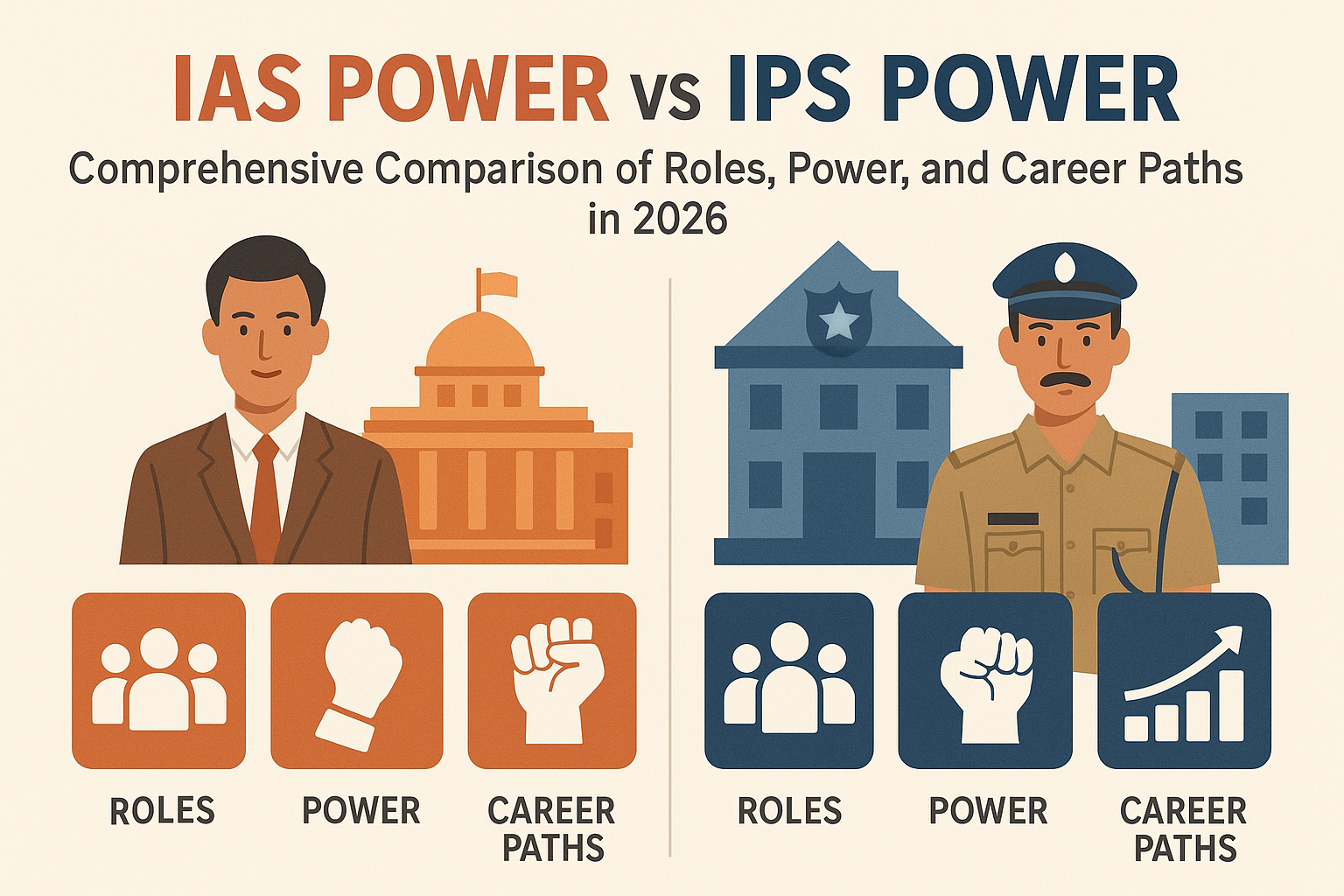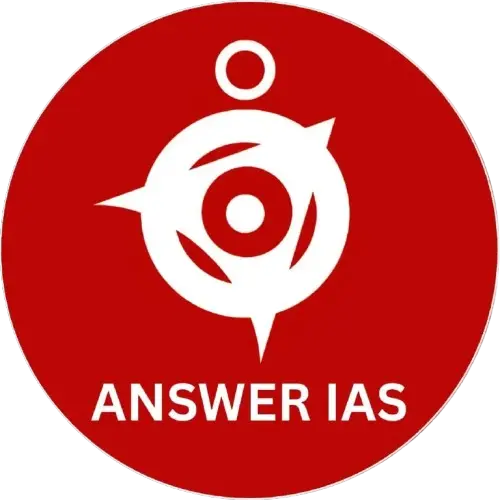
Introduction
India’s civil services offer one of the most prestigious and transformative career avenues for aspirants across the country. At the pinnacle are the Indian Administrative Service (IAS) and the Indian Police Service (IPS), both recruited through the formidable UPSC Civil Services Examination. While these two services share a common gateway, their spheres of influence, day-to-day responsibilities, control over resources, and growth trajectories sharply diverge. This in-depth article provides a precise, SEO-focused comparison of IAS vs IPS, empowering you to make an informed decision as you pursue your dream of making a difference in India.
IAS vs IPS at a Glance
| Feature | IAS (Indian Administrative Service) | IPS (Indian Police Service) |
| Function | Administrative governance, policy formulation | Law enforcement, order maintenance, crime control |
| Focus | Policy, development projects, public administration | Crime-investigation, security, public safety |
| Training Academy | LBSNAA, Mussoorie | SVPNPA, Hyderabad |
| Uniform | No | Yes |
| Top Rank | Cabinet Secretary (GoI) | DGP (Director General of Police), State |
| Reports To | Chief Minister/Secretariat | State Home Dept/Ministry of Home Affairs |
| District Hierarchy | District Collector/Magistrate | Superintendent of Police (SP) |
| Batch Size | 150–180/year | 150–180/year |
| Initial Salary | ₹56,100/month (7th CPC) | ₹56,100/month (7th CPC) |
Core Differences: IAS vs IPS Explained
Domain and Authority
- IAS Officers: Serve as administrators, heading the district as District Magistrate/Collector. Direct policy implementation, coordinate with all government departments, and supervise development projects. They influence law and order directly through their powers as DM.
- IPS Officers: Lead state and district police, control internal security, oversee intelligence, manage crime prevention and investigation. Their operational command covers all police and paramilitary personnel in their jurisdiction.
Recruitment, Training, and Selection
- Common Entrance: Both drawn from the top ranks of the UPSC Civil Services Examination.
- Training:
Nature of Work
- IAS: Strategic planning, administration, revenue management, policy implementation, disaster response, and public welfare. Responsible for organizing elections, managing government schemes, and ensuring smooth governance at district/state/central levels.
- IPS: Policing, law enforcement, crime control, maintaining peace, leading emergency response, countering terrorism, running anti-narcotics/cybercrime/corruption wings, and ensuring public safety and order.
Roles and Responsibilities in Detail
IAS
- Head all administrative functions in a district/state
- Implement centrally-sponsored projects and flagship schemes
- Lead crisis management (natural disasters, epidemics)
- Oversee revenue, land management, and social welfare
- Facilitate interdepartmental cooperation, track development indices
- Serve as Chief Secretary (state apex), Cabinet Secretary (national apex)
IPS
- Maintain law and order, ensure safety and security
- Oversee policing, modernize forces, innovate crime prevention
- Lead investigations (robberies, murders, terrorism, cybercrime)
- Manage traffic, public events, and VIP security
- Command special units (crime branch, anti-terrorism, intelligence)
- Rise to DG of state police, lead national agencies (CBI, IB, NIA)
Who Holds More Power and Influence?
The IAS Edge
- Administrative Supremacy: District Magistrate/Collector has oversight over police, revenue, social programs. IPS officers report to DM on key matters.
- Resource Command: Controls district budgets, project allocations, and resource dispersal.
- Cross-departmental Influence: Heads policy design and execution across all sectors—health, finance, education, and more.
- National Ranking: Cabinet Secretary is the most senior civil servant in India—exclusively for IAS.
Unique Powers of IPS
- Direct Field Command: Heads all law enforcement in the district/state—SP and DGP have the authority to act in emergencies.
- Internal Security: Special powers during curfews, riots, or disasters; empowered for rapid mobilization and response.
- Lead in Crisis: IPS officers take charge during high-pressure events: terrorist incidents, riots, intelligence operations.
Practical Reality
Both services depend on each other for smooth administration. While the administrative edge goes to IAS, IPS officers exercise immense field power, especially in times of crisis. Inter-service relationships are built on mutual respect and clear lines of authority.
Career Progression: A Stepwise Breakdown
IAS Hierarchy
- Sub-Divisional Magistrate (SDM)
- District Collector/District Magistrate
- Commissioner/Joint Secretary/Secretary (State level)
- Additional Chief Secretary/Principal Secretary
- Chief Secretary (Head of state bureaucracy)
- Cabinet Secretary (Head of central government bureaucracy)
IPS Hierarchy
- Assistant Superintendent of Police (ASP)
- Superintendent of Police (SP)
- Deputy Inspector General (DIG)
- Inspector General (IG)
- Additional Director General (ADG)
- Director General of Police (DGP)
Both receive robust promotion cycles, with postings at state, national, and even international levels.
Salary, Allowances, and Perks
| Perk | IAS | IPS |
| Starting Salary | ₹56,100/month (7th CPC) | ₹56,100/month (7th CPC) |
| Top Salary | ₹2,50,000/month (Cabinet Secretary) | ₹2,25,000/month (DGP) |
| Accommodation | Premium, usually in best locations | Excellent, near police quarters |
| Transport | Official car + driver | Official car + police escort |
| Staff | PA, peons, orderlies, guards | Orderly, police protection |
| Other Benefits | Travel allowance, furnished residence, security, education sponsorship for children | Same, plus risk/investigative allowance |
| Job Security & Pension | Very high (All-India Service rules) | Very high (All-India Service rules) |
Which Service Is Right for You?
Choose IAS if you:
- Dream of shaping public policy, running development projects, and leading government at the highest administrative levels.
- Prefer influencing governance at macro and micro scales, commanding resources, and overseeing inter-departmental coordination.
Choose IPS if you:
- Thrive in challenging, on-the-ground environments, enjoy leading teams, handling emergencies, and prioritizing security and prompt action.
- Wish for a uniformed, action-based service with command in crisis situations and major influence over law and order.
Conclusion
IAS and IPS both rank among the most powerful, impactful, and sought-after careers in India. They attract the brightest talent and offer unique avenues to serve society at scale. While the IAS generally wields greater administrative authority and influence across all sectors, the IPS commands the frontline in security, crisis, and law enforcement. Your ideal choice should align with your personality, skills, and career aspirations. Whichever you choose, rest assured—both offer lasting impact, exceptional rewards, and lifetime prestige.

Comments (2)
UPSC Mains Answer Writing in 7 minutes : Strategy & Tips - AnswerIASsays:
July 30, 2025 at 7:19 am[…] Read Also : IAS power vs IPS power […]
UPSC Booklist : Comprehensive Guide for Prelims, Mains, and Interview - AnswerIASsays:
July 30, 2025 at 9:05 am[…] IAS vs IPS Power […]